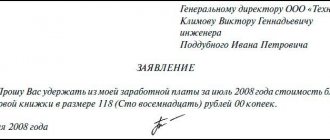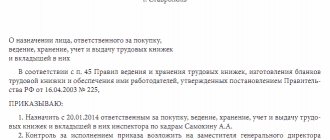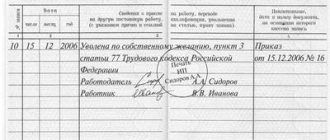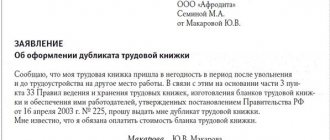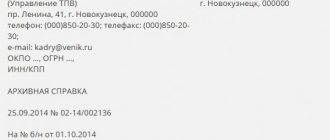Wanting to increase their own value in the labor market, individual citizens resort to forgery, distorting or introducing incorrect information into the documentation, considering this act frivolous. However, liability for falsifying a work record comes in accordance with the application of both administrative and criminal norms. The law obliges the company hiring the employee to carefully check the documents submitted by him for authenticity, as well as for the reliability of the information provided. Detected forgery is grounds for dismissal, and in some situations, contacting law enforcement agencies. Subsequent sanctions are determined by the degree of guilt. In extreme cases, the citizen faces a real prison term.
What is the purpose of falsifying a work record?
Important! Even if the work book form turns out to be false through no fault of the employee, such a document will not have legal force.
An employee may have a fake work book even because he simply did not know what a document that meets legal requirements should look like. However, most often it is unscrupulous applicants who try to mislead a potential employer. It also happens that the previous employer is at fault because he bought a blank form at a regular kiosk or entered the information inappropriately.
If we talk specifically about attackers, they can pursue various goals by handing over a fake work book to the employer:
- concealment of unpleasant facts (for example, at a previous place of work, an employee violated labor discipline, made a serious mistake or committed an offense, which was recorded in the work book, and now does not want to lose the opportunity to get a similar position);
- new employment (for example, an employee reported in a fake work book that he has work experience and higher qualifications, thereby gaining a chance for employment and an advantageous position in comparison with other candidates);
- registration of a pension benefit (the work book indicates a long insurance period, and therefore a higher pension is assigned).
FORGERY OF A RECORD AS A RESULT OF COMMERCIAL BRIBERY
In addition to the official component inherent in the work book, in our country this document performs another important function during employment. It plays the role of a letter of recommendation, which can influence the decision of a future employer to hire a person. It reflects the reasons for dismissal from previous jobs, as well as information about awards and thanks.
The same arguments are also used by persons applying to commercial organizations to obtain a record of work experience. In this “deal,” the petitioner persuades the assistant, for a fee, to make an entry in his work book, which can help him find a job. Thus, both parties (the petitioner and the assistant) become participants in a criminal act qualified under Art. 204 of the Criminal Code of the Russian Federation “Commercial bribery”.
Article 204 of the Criminal Code of the Russian Federation describes two independent elements of crime: a) illegal transfer of remuneration to a person performing managerial functions in a commercial or other organization (parts 1 and 2); b) illegal receipt of such remuneration (parts 3 and 4).
The fact of a false entry in the work book can be established during operational search activities when one of the parties to the crime (giving or receiving money) contacts law enforcement agencies with a report of a crime being committed. In addition, a false entry in the work book can be detected by a Pension Fund employee when checking the documents provided for calculating a pension.
However, crimes under Art. 204 of the Criminal Code of the Russian Federation, like corruption ones, are latent.
Transfer of bribe.
As a rule, the identification of crimes provided for in parts 1 and 2 of Art. 204 of the Criminal Code of the Russian Federation, occurs on the basis of a statement from a company representative, to whom a person applies with a request to enter information into the work book that does not correspond to reality. This crime is detected much less frequently than the detention of persons who receive bribes (parts 3 and 4 of Article 204 of the Criminal Code of the Russian Federation).
When considering the said application, the investigative body must take measures to establish and assess the presence of elements of a crime that allow qualifying actions under parts 1 and 2 of Art. 204 of the Criminal Code of the Russian Federation. In particular, in order to prove the objective side of the crime, it is necessary to find out and record: - intentions to transfer money or provide services for illegally entering false information about work activity into the work book in the interests of the giver; — conditions for the transfer of property or provision of services (place, time, method of transfer of money), including measures to disguise it; — voluntariness of filing a complaint about commercial bribery; - damage caused by commercial bribery.
The actions of a person who proposes to add false information about work activity to the work book are carried out only with direct intent. That is, he understands the illegality of transferring money or other property to someone who performs managerial functions in an organization for performing an action (inaction) in his interests and wants these actions to be performed. Despite the fact that the motive for committing a crime does not affect qualifications, it must be established. That is, you need to find out why the briber subsequently wanted to use the work book with a false entry.
To investigate the case, it is also important to find out: - the relationship between the subjects of the crime; - the circumstances of their acquaintance and establishment of contacts, ways of forming and maintaining relationships; — the environment surrounding commercial bribery; - the circumstances of the conspiracy regarding the transfer, receipt as a gift of money, valuables, etc., the role of the organizer and other participants.
Finally, in the process it is necessary to establish: - the exact name of the organization, the subject and purpose of the activity, the conditions and procedure of work, regulatory materials governing them (charter, rules, instructions, orders, instructions, etc.); - the position of the person to whom bribery is offered, the period of work in it, the range of responsibilities (with special attention to the presence of the authority of this person to hire and dismiss), regulatory materials governing his activities.
FROM PRACTICE.
On October 26, 2010, the Neman City Court of the Kaliningrad Region passed a verdict against K. The convict intended to officially find employment at Stroy-West LLC. He knew that one of the conditions for employment is the presence of work experience in the construction industry, recorded in the work book. To prove his length of service, K. turned to the director of NemanStroyServis LLC with a request to make a fictitious entry in his work book about working for the LLC for a fee. After the agreement, while in the office of the director of NemanStroyServis LLC, K. handed over to the director his work book and money for performing actions in his interests, expressed in the latter making a fictitious entry in the work book (case No. 1-90/2010).
Receiving a bribe.
Bribery, like taking a bribe, is a crime that is usually detected little more easily than the reverse process.
This is due to two reasons. Firstly,
information that an official of a commercial organization makes false entries in the work book for money can be verified during an operational investigation (operational experiment, observation, wiretapping of telephone conversations). Actions to make a false entry are, as a rule, one-time and it is extremely difficult to prove after the fact the fact of transfer of funds for the service provided.
Secondly,
information about the person who offers commercial bribery comes only from the person who is offered a reward for illegal actions. The appearance of such information by law enforcement agencies depends on the integrity of the person who was approached with a proposal to forge a work record book. At the same time, information about a person who takes money for entering false information in a work book may come not only from a person who initially decided to commit a crime and then abandoned it. It can be obtained during operational search activities, and can also be provided by the security services of companies that screen applicants for vacant positions.
An operational investigation to record the fact of receipt of commercial bribery can be initiated either at the request of a person who contacted a law enforcement agency with a report of a crime, or based on information from the law enforcement agency itself as part of an operational accounting case.
FROM PRACTICE.
The Pachelmsky District Court of the Penza Region, with a verdict dated August 18, 2015, convicted K. honorably. 3 tbsp. 204 of the Criminal Code of the Russian Federation. K. served as chairman of the Ararat Union of Industrialists and Entrepreneurs. He had the authority to hire and fire workers. In May 2020, S. approached him with a request to make entries in his work book stating that he allegedly worked at the Ararat SPSPC. Inside his car, K. personally made entries in S.’s work book under numbers 1 and 2, containing information that did not correspond to reality: about S.’s acceptance into the Ararat SPSPC and about S.’s dismissal at his own request. After which he received money from S., but was immediately detained by officers of the Russian Department of Internal Affairs in the Pachelmsky district. As follows from the case materials, S. initially approached K. with a request to make false entries in the work book provided to him, so that this would help him get a job in one of the companies in the Moscow region. The crime would have been committed and would have remained undetected if S. had not had a conversation with his friend T., who convinced him of the illegality of his actions and persuaded him to contact law enforcement agencies. After the police officers accepted the statement from S., operational search activities were carried out, in particular an “operational experiment”. Before it began, S. was examined. Then the operatives gave him money and inspected his work record, which recorded the absence of records of work at the Ararat SPSPC. Then S. was given the means to make an audio recording. After carrying out the operational investigation, police officers, together with employees of the Investigative Committee of Russia, again conducted a personal search of S., who voluntarily issued a work book with records of work at the Ararat Specialized Industrial Union and an audio recording device. The operatives also inspected the scene of the incident - K.'s car, during which money received as a commercial bribe was seized. Based on the data obtained as a result of the operational investigation, evidence was generated, which subsequently formed the basis for the conviction (case No. 1-39/2015).
When receiving information from operational sources about the facts of entering false information into work books, employees of operational units, as a rule, plan and conduct several operational operations “operational experiment” with the participation of different persons. Carrying out several similar types of operational investigations is necessary to eliminate the element of provocation and obtain information that the illegal actions of the head of a commercial organization are the norm for him, and not the exception to the rule.
FROM PRACTICE.
By the verdict of the Kamensky City Court of the Penza Region dated September 30, 2013, D., director of Kholodtorgtekhnika LLC, was convicted. Information that D. had committed illegal actions came to the police from operational sources. In order to verify this information, operational search activities were planned and carried out with the participation of two individuals, with a significant gap in time. This was necessary to prove that D. systematically received money for making false entries in work books. As a result, the operatives recorded two episodes of crime, when D. illegally, with his own hand, entered false information into the work books of B. and V. - 06/27/2015 and 08/26/2015. For these crimes provided for in Part 3. Art. 204 of the Criminal Code of the Russian Federation, D. was sentenced to 2 years and 6 months of suspended imprisonment with a fine of 40 thousand rubles. (Case No. 1-114/2013).
https://youtu.be/kDr2KgpOJLI
How do citizens falsify work records?
Forgery of a work book can be done in several ways, namely:
- a person can purchase from scammers a fake seal of an existing or non-existent organization;
- you can agree with a commercial company that is periodically transforming to have a seal put on it;
- it is possible to make a false entry in the work book;
- you can replace a legally issued work book;
- some replace several sheets of a document;
- False entries are often made (most often the employer enters information about an employee who does not actually work for the company).
Procedure for detecting a counterfeit
If a fake TC is detected, you cannot remain idle. A number of activities are expected to be carried out:
- Refusal to hire or make an entry in the work book is not allowed.
- Find out the employee’s level of awareness of violations made in the Labor Code.
The nature of the following actions depends on the position of the worker.
Innocence dictates the need to contact the previous employer to correct the mistakes made or to issue a new book (duplicate).
Finding out the circumstances surrounding the employee’s participation in the fraud process facilitates reporting the crime to the competent authorities (labor inspectorate, police, prosecutor’s office). Dismissal is not allowed until a decision on guilt is made in court. This will be followed by termination of the employment contract under Article 81 of the Labor Code of the Russian Federation.
Forgery of a work record: what the law says
Important! If the employer, after he hired a new employee, discovered that the work book was fake, and the employee quit before the circumstances were clarified, he is considered guilty of forging the document.
According to current legislation, an employer who certified a fake work book must pay a fine. However, if he is able to prove his non-involvement in the case (after all, the law does not oblige employers to check the authenticity of the documents submitted by the employee), the court will probably not oblige him to bear financial responsibility.
With an employee who handed over a false work book to the employer, the law allows the employment contract to be terminated, but it is necessary to prove his guilt. Because if a fake book was issued by a previous employer, the employee needs to issue a new document, help in collecting certificates from previous places of work and be allowed to continue working.
| Employee Responsibility | Employer's liability |
| Mandatory forced labor lasting up to 240 hours; arrest for a period of 6 months; executive works for a period of up to 2 years; imprisonment for 2 years. | A fine of up to 200 current minimum wages (after an inspection, if fraud, production of counterfeit books, or forgery is discovered). |
Arbitrage practice
The current norms and practice of considering court cases indicate that when the fact of falsification of a labor document is revealed, the perpetrators are necessarily brought to appropriate measures of responsibility.
It is important to remember that penalties apply to the employee who committed this act, as well as to the business entity in which this person was registered as an employee.
It is also necessary to take into account that when terminating an employment contract with an employee due to the fact that the employee falsified his employment record, without conducting an investigation, it may lead to his reinstatement in his previous place.
In addition, if a forgery of a signature in a work book is detected, liability will also arise in accordance with the law.
However, to start a criminal case, it is necessary for the employer to draw up a statement and submit it to the regulatory authorities for consideration.
Forgery of a work record: how to recognize a fake document
Important! The employer should pay attention to work records, since it is much better to recognize a false document from the very beginning than to later prove non-involvement and bear financial responsibility.
You should pay attention to the following things that indicate that the document is not genuine:
- compositional or mechanical traces of counterfeit are visible;
- there are logical contradictions in the records;
- a non-standard font was used;
- there are spelling errors;
- the color of the forms is different;
- crossed-outs, blots, and corrections are found that are not permitted by current labor legislation;
- no seal.
| Document type and size | There are 3 versions of the work book - a sample of 1938, 1974 and 2003:
|
| Printing house | On the final page is the name of the organization that published the book. On a document from 1974, “Gosznak 1974” is put (sometimes the language of the republic is also indicated), and on the TC of 2003 there should be a sign “MPF Gosznak 2003”. |
| Work book form | Material – cardboard (old books), vinyl or calico; image of the coat of arms of the Russian Federation or the USSR; pages are unlinked; There is a cover page with information about the employee. |
| Sheet numbering | If the page numbering of the document is incorrect, it means that the sheets have been pulled out. If some pages are different in number color, font or color, then the pages have been replaced with others. |
| Series and number | The 1974 document contains a single red number on ten pages: 1, 5, 9, 13, 17, 21, 25, 29, 33, 37. In the 2003 book, numbers are written in black ink on 11 pages: 1, 3, 9, 15, 19, 23, 27, 31, 33, 37, 39. The series must match the year the document was issued (see the following table). |
| Watermark | The 1977 example has a wavy line watermark on all but the outer 2 pages. The 2003 sample has the “TK” watermark in various colors and a fine mesh. |
| Identifiers | Depends on the year in which the documents were issued. It is enough to compare 2 books of the same type to notice that the difference in the identifier lies only in the different dates of creation of the document. |
How to check a document series:
| A series of documents | Year of issue |
| AT-I | 1974-1976 |
| AT-II | 1977-1979 |
| AT-III | 1980-1982 |
| AT-IV | 1984-1985 |
| AT-V | 1986-1989 |
| AT-VI | 1990-1992 |
| AT-VII | 1993-1997 |
| AT-VIII | 1997-2000 |
| AT-IX | 2001-2003 |
| AT-X | 2003 |
| TK | 2004-2005 |
| TK-I | 2006-2007 |
| TK-II | 2008-2009 |
| TK-III | 2010 |
See how to find your serial number, watermark, and other markings ⇒ here.
Responsibility and punishment for counterfeiting
Some employees think that if they work in several organizations, then they need several workers. The Labor Code clearly regulates this situation. Therefore, an employee must have one work book, and it is stored at the main place of work. While the part-time employer may be presented with a copy of the main document.
Therefore, there is no need to have two work books. But if an employee does not have such a document at all, then all obligations fall on the shoulders of the manager who did not issue this document to his employee. Such a violation is punishable both criminally and administratively.
We invite you to familiarize yourself with the difference between a civil contract and an employment contract, table
What the law says
Labor legislation does not have clear instructions as to whether citizens are allowed to have only one labor card and no more.
But the law implies that one document is enough for an employee, even if he works in several organizations.
In fact, if a citizen uses two labor cards, this is not punishable by law, and he will not bear responsibility. The exception is those cases when the work is fake.
- Receiving a pension. In this case, a long period of work is indicated, on the basis of which calculations are made and the amount of the pension is established.
- Obtaining a prestigious position. The document indicates higher positions, experience in similar positions, high qualifications and other advantages that may affect getting a job.
- Concealing negative facts from a previous place of work. This may include: the fulfillment of unqualified obligations in the presence of a higher education diploma, a gross mistake made when filling out a document, a serious misconduct due to which the employee cannot perform duties in specific positions.
- size 10 x 14 cm;
- 40 pages to fill out;
- the form number is repeated on pages: 1, 5, 9, 13, 17, 21, 25, 29, 33, 37;
- the number is written in red;
- on the cover there is the coat of arms of the USSR;
- All sheets (except the last two) have serpentine watermarks.
In these cases, both the employer and the employee are responsible for entering false information into the work book.
How to counterfeit
For a certain period of time, work books were freely available for sale, which allowed them to be produced by any organization. Many employers required their newly arrived employees to bring blank employment forms or inserts with them.
In order to falsify a work record or an entry in it, it was necessary to find any organization that was transformed periodically. Choose a moment after the reorganization, but before the liquidation of the company stamp.
At the time of the free sale of employment forms, there was no control over the activities of personnel employees, and employers kept old seals for providing such services.
A citizen could independently or with the help of friends fill out the employment form and make the necessary entries, certifying everything with seals.
Today, a fake work book or falsifying entries in it using this algorithm are impossible due to widespread control. In addition, in case of official employment, the employer himself provides the work permit.
Currently, official forms are fundamentally different from fake ones, so it is quite easy to expose the deceivers. And if citizens present a fake document, then, apparently, they do not know how serious the forgery of a work record book is.
Official forms have some features and security measures that distinguish them from counterfeits. But those employers or personnel department employees who have never encountered old forms should know their distinctive features.
Old samples have the following characteristics:
Sample forms from 2003 have other distinctive features:
- size 8.8 x 12.5 cm;
- 44 pages to fill out;
- the form number is repeated on pages: 1, 3, 9, 15, 19, 23, 27, 31, 33, 37, 39;
- the series is written in black, the number in red;
- the coat of arms of the Russian Federation is located on the cover;
- watermarks have a two-color design.
The samples listed are genuine. In addition, the last page should indicate the printing house where the forms were produced. On the real labor note it will be written that it was made by Goznak. Other printing houses do not have the authority to do this.
Any specified discrepancy should raise questions from the manager. You can compare the provided form with the above for consistency. If there are discrepancies, the citizen may be held liable for falsifying the work record.
Actions
If a manager or authorized person discovers a fake document, this fact cannot be ignored. Otherwise, the unresolved problem will result in a big conflict with the relevant authorities.
The employer has no right to hire a citizen and not make entries. It is also impossible to refuse employment because of such a document. It is necessary to find out from the employee himself whether he is aware that his work record has incorrect records or simply does not meet the regulatory requirements.
The situation is more complicated when a citizen, independently or with the help of third parties, has drawn up a work record or made entries in it. Is there liability for falsifying a work record? Yes, but the manager must first report this fact to any of the authorities (the prosecutor's office, the police or the labor inspectorate).
It is impossible to dismiss an employee based on the discovery of a fraudulent employment record until it is proven. Further, the citizen can be dismissed under clause 11, part 1, art. 81 Labor Code of the Russian Federation.
Common mistakes
Error: The employee whose employment record was found to be fraudulent was immediately fired.
Comment: An employee can be fired for falsifying a work record book only after his guilt has been proven in court.
Error: The employer produced a duplicate work record book, which turned out to be fake when the employee was hired.
Comment: A duplicate cannot be issued, since the original work book contained unreliable entries.
Employer's liability
An employer is always held accountable if he employs an employee with a false document. It does not matter whether this was done intentionally or by accident. By law, an organization is required to check the documents of its employee before hiring him.
If an organization is negligent in checking documents, it may be subject to an administrative fine of 1-2 thousand rubles. If a company takes part in the preparation of a fake labor document or makes false entries, then the guilty person may be brought to criminal liability.
Working on someone else's document
Working on someone else's document, like falsifying a work book, the responsibility for which was discussed earlier, does not bring anything good. And the employer’s attempt to turn a blind eye to such a step on the part of the employee will not end well for the former.
Firstly, where is the guarantee that a couple of years after employment an employee will not come and demand to establish the length of service for pension accruals? And even if the employee does not achieve what he wants, the employer may experience many unpleasant moments from litigation.
Secondly, no one can reliably know the origin of such a work record. In practice, personnel officers hired a person with someone else's book, while the true owner of the work book was dead.
Thirdly, an employee who treats a colleague unkindly can report such a situation to the authorities, which will entail criminal liability. And it will be very difficult to protest the fact of document forgery.



